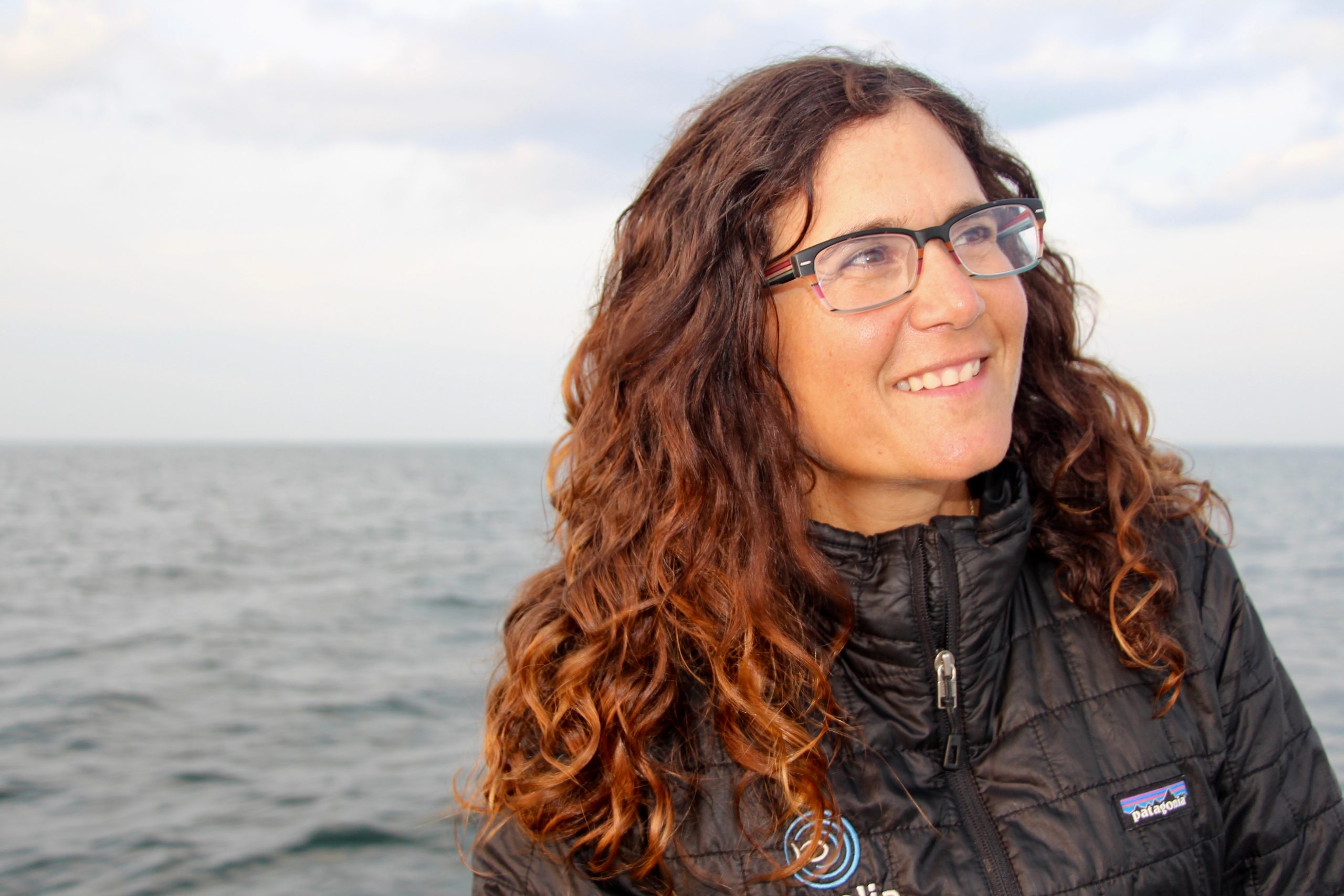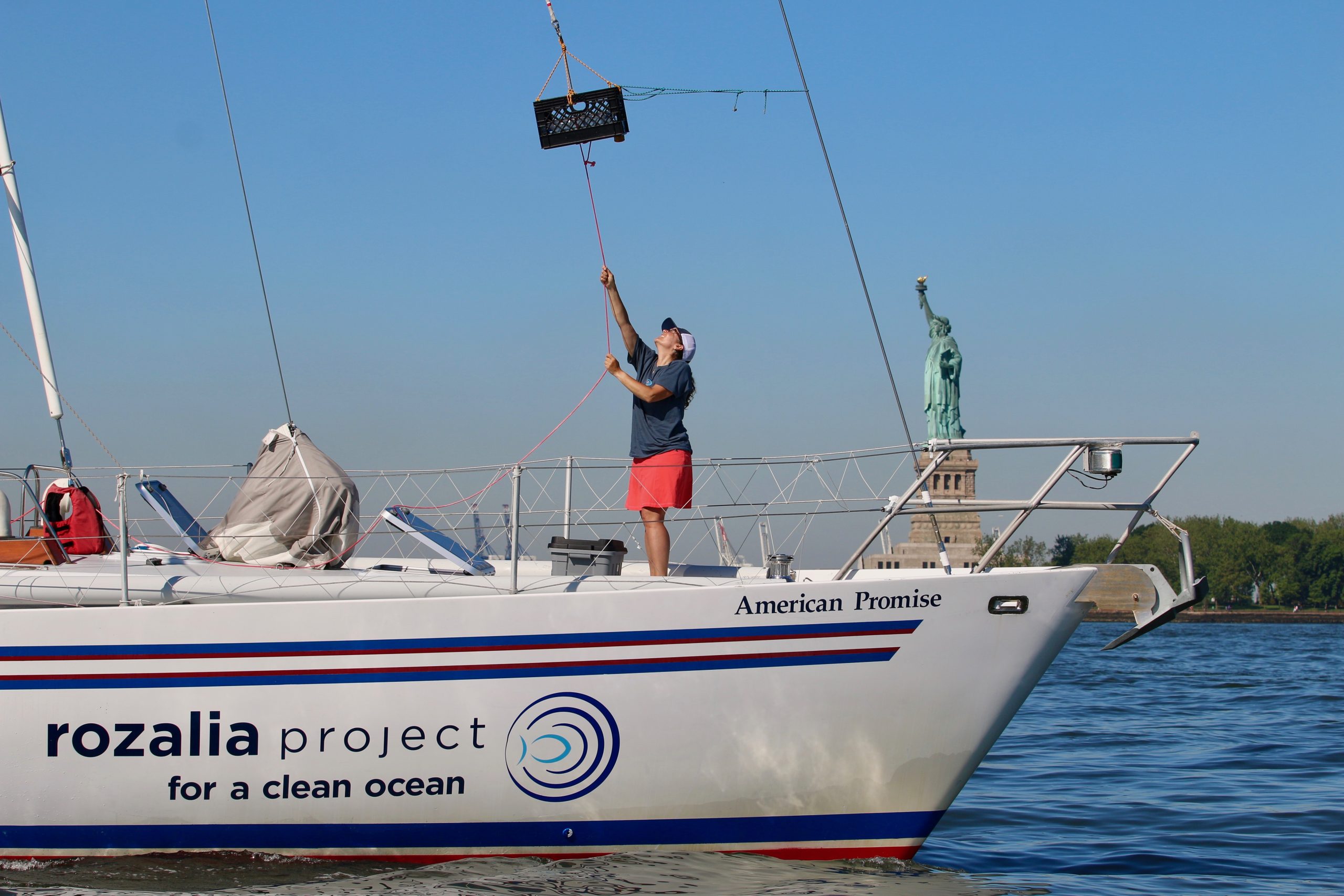February 11th is International Day of Women and Girls in Science. In celebration, US Sailing is recognizing Rachael Miller. Rachael is the Founder of Rozalia Project for a Clean Ocean, Co-Inventor of the Cora Ball, National Geographic Explorer, and an Explorer’s Club Fellow. She is focused on protecting the ocean and addressing the problem of marine debris through cleanup, prevention through education, embracing innovation and technology, and conducting solutions-based research in urban and coastal waters from surface to seafloor. Rachael holds a USCG 50-ton Master’s license and captains the 60’ sailing research vessel American Promise. She trains ROV pilots for VideoRay, helps write curriculum for US Sailing’s REACH program, and mentors students at the New York Harbor School. Her academic background is in marine studies and underwater archaeology. She lives in Vermont and loves to ski as much as sail.
US Sailing had a brief chat with Rachael about what inspired her to get involved in the sciences and why it’s so important for women and girls to pursue and explore STEM.
What was (or is) your favorite subject in school and why?
For me that is a trick question, and that is because I have always loved arts and sciences equally. In school, my favorite subjects were art, math (geometry in particular) and, of all the sciences, I’ve always enjoyed physics.
When was the first time you became actively involved in STEM? Do you recall a specific project or initiative?
I do have to credit sailing for my interest in physics and science. I’ve been sailing for my entire life, and I started teaching sailing at 13. Of course, when you start teaching something, you have to understand it in a different way than if you’re just simply doing it. Part of learning how to teach sailing for me was learning how to explain the whys and the hows, so as early as 13 or 14 years old I remember thinking about how to explain lift and how sails work to kids not much younger than myself.
How have your beliefs, motivations and aspirations changed over time? When did a career in STEM become a priority or choice?
I don’t think I’ve had much change in my attitudes towards science personally. I was always involved in something that was related to science – mostly applied science through sport, even from a young age – sailing, competitive swimming and skiing. In sailing and the type of skiing I did (moguls), I was usually outnumbered by guys.
I have done a lot of different things related to connecting people to the water and, over the years, I have become more aware of my role as a woman in science. When I started doing shipwreck tours with ROVs, I captained the boat, assembled the robot, piloted it to a shipwreck, told the history of the wreck, and then brought it back alone. It was similar with our ROV work and marine debris. What I realized was boys don’t care who shows up with the robot – they’re not thinking about it. But I do think young girls notice. And while I don’t have a tangible moment in mind, I have realized that as a woman in my field I have an opportunity for my presence to sink into young girls’ minds. It’s important representation, especially in a field where there was little representation previously. I have been the only woman at an entire underwater technology conference, and I have come to realize that my presence as a woman, doing what I do and being very comfortable with it, is an opportunity to show people what’s possible.
What is the coolest thing about your work/research?
I can collectively call what I do expedition science and, for someone like me, that is the coolest thing. My work is to better understand, and find ways to protect, one of my favorite venues – which is anything that is liquid or frozen water (oceans, lakes, rivers, etc.). Part of what I need is for every day to be a little bit different and have a high dose of being outside. In my work, I get to move around and sail and apply science to understand our place in the world in order to make it better.
There was a point in my college career where I had to choose what I wanted to do. I participated in a semester abroad with School for Field Studies and the University of La Paz in Mexico which included some very good, hard science in marine mammal biology and conservation. But all the science we were doing there was the same thing every day. Accuracy depends on repetition, but there wasn’t any motion. In the work I’m doing now, that I have designed myself, we are using accuracy through repetition in terms of methods, but we are doing it to explore and sample an entire river from the mountains to the sea, with Manhattan in between. There’s nothing repetitive about that!
How could you contribute your wisdom, expertise, or ideas to empower other women and girls interested in your field?
I’ve adopted a strategy that works for me and perhaps it may work for other people. Personally, I will take a running leap off the figurative cliff, but only after I’ve controlled the controllables. And I don’t mean this just in science, I mean this in life. I do my research in the beginning and, while I don’t necessarily have all the answers, I’ll have a pretty good idea of what I think will happen. And then I go ahead and jump off the cliff. Otherwise, you don’t get to know what you are capable of.
I recommend people get comfortable with the fact that you can take a risk without it being a blind risk, but a calculated risk where you’ve done everything you can to make it likely to work. Very few things are completely guaranteed to work. As long as you have a parachute of some sort (for me, that is usually multiple back plans), then it’s worth taking calculated risks.
I don’t know if people have heard this often enough – failure is just part of a bigger process, part of the process. If you try something and it doesn’t work, that’s very normal. It can be disappointing, depending on the magnitude, but it doesn’t have to be the end of your career. If you set out to invent something new, failure is part of the process. Failure is all around us. If you controlled the controllables, took the risk of trying something new, and it didn’t work – then that’s awesome. That’s learning!
I think the unknown can be quite exciting. If something piques your interest and you see a way to make it happen – do the research, create a few back up plans, and then don’t be afraid to do it.


